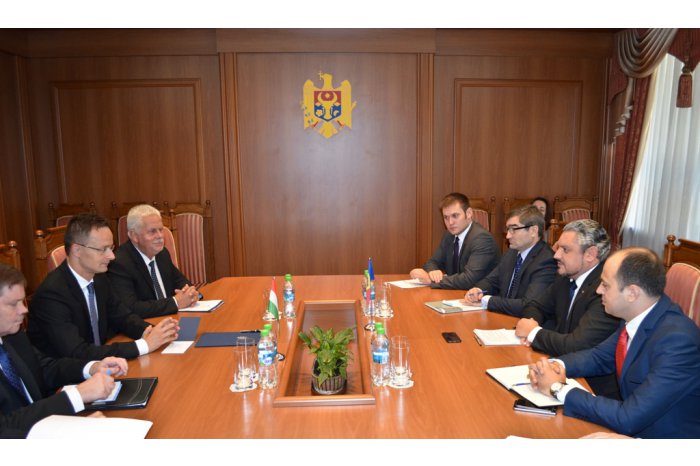Hungary to share with Moldova experience of interaction, cooperation within EU
15:36 | 13.09.2016 Category: Official
Chisinau, 13 September /MOLDPRES/ - Deputy Prime Minister, Foreign and European Integration Minister Andrei Galbur today had a meeting with Foreign Affairs and Trade Minister of Hungary Péter Szijjártó, on a working visit to Moldova, the Foreign and European Integration Ministry’s information and media communication service has reported.
After the meeting, Minister Andrei Galbur made the following press statement:
“Good afternoon, „Bună ziua,
I greet you at the headquarters of the Foreign Ministry,
Dear Mr. Minister Szijjártó,
I would like to begin by saying that I am glad very much of your visit to Moldova and I want to once again warmly greet you here in Chisinau.
Today, we had occasion to continue the open and constructive dialogue set on the last period and managed to have substantive discussions on topics of common interest, either we are speaking about the bilateral ties between our countries, European processes or regional and international situation.
We have both agreed that there are needed opportunities to strengthen this bilateral cooperation, especially if we mean the economic dimension, where the potential exceeds the present level by far in this respect.
At the meeting, we spoke about the process of implementation of reforms in Moldova, highlighting the central role played, to this end, by the Roadmap on priority reforms’ agenda and the results achieved in the first half of this year. Certainly, the focus of the debates represented the short, medium’ and long-term actions, in order to achieve the objectives set for implementing the Moldova-EU Association Agreement. I would like to thank colleague Peter for the constant support Hungary is providing to our country’s European integration.
We also discussed actions in the sense of continuing the dialogue within the bilateral Forum for European integration and we also appreciated my Hungarian colleague’s willingness to share with us the experience of interaction and cooperation within the European Union.
Certainly, we appreciated the valuable support the government of Hungary is providing to key sectors of the Moldovan economy, such as, in particular, agriculture, and I was assured by my colleague that this backing would be continued.
Beyond these subjects, we reviewed the present stage concerning the Transnistrian conflict settlement, which stays a basic goal for us and which is to be settled based on identifying a comprehensive political solution, by observing the sovereignty and territorial integrity of Moldova.
A distinct subject was our cooperation within the international organizations, as well as, just as I said in the beginning, issues of the situation in the region.
We also discussed the cooperation in the education and science sectors. The government of Hungary offers, in particular, support and scholarships to students from Moldova within the Stipendium Hungaricum Programme. Hence, we found out that, in a relatively short period, the number of these scholarships had doubled; yet, there is more willingness on behalf of Budapest partners to contribute to increasing this number.”
(Editor A. Raileanu)

